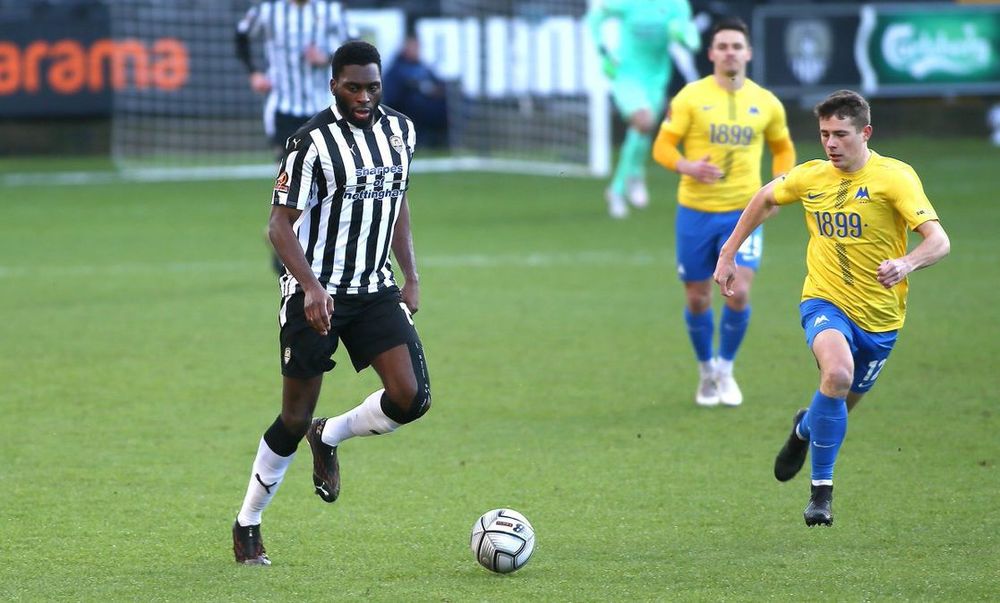
Inih Effiong
Striker Inih Effiong was another to have pitched in and out of the Southern League.
Still going strong now, the 30-year-old is currently on a season-long loan with National League side Notts County from League Two outfit Stevenage.
Effiong joined Stevenage in June 2020 from another National League side, Dover Athletic, where he had been since June 2018.
The Londoner made 3 appearances for Scottish Premiership side Ross County after signing from Woking for an undisclosed fee in January 2018.
He joined Woking in May 2017 and scored 10 goals for the Cards in 35 appearances before making the move to Scotland.
Before joining Woking, the 6`3” striker played for Biggleswade Town where he scored 23 goals in the first half of the 2016/17 Southern Premier Division season and that form earned him a move to Barrow AFC.
He started his career at St Albans City in 2008, and also had spells at Boreham Wood, Chesham United as well as Southern League teams Dunstable Town, Burnham and Arlesey Town.
Rugged left-back Micky Evans was spotted playing for Birmingham League side Vono Sports by Walsall, who signed him as an amateur to begin with in 1962.
Signing professional in May 1964, he went on to make over 250 appearances for the Saddlers and scored at Everton in the 1971/72 FA Cup Fourth Round.
He moved to Swansea City, initially on loan in December 1972, netting 6 goals in 92 outings while at the Vetch Field before following manager Harry Gregg to Crewe Alexandra in July 1975.
A return to the West Midlands followed and he had spells with Southern League Premier Division sides Worcester City and Redditch United from 1977 until the early 1980s.
He continued to play on in the West Midlands (Regional) League with Rushall Olympic and Malvern Town and later turned out for the All Stars of Walsall, West Bromwich Albion and Aston Villa and the highlight of these charity matches was winning a medal at Wembley for West Brom when they defeated a Nottingham Forest side containing the likes of John Robertson and Gary Mills.
Ray Wright was one of the many players who had large chunk of his playing career put on hold during the Second World War.
He had signed for Wolverhampton Wanderers in May 1936 from Woodbourne Athletic, and went on to make 8 appearances, scoring one goal.
He signed for Exeter City in March 1946 and featured in the side that took part in the Division Three South Cup (Southern Section).
He scored twice in 6 matches, including one on his debut against Torquay United at Plainmoor.
Whilst staying in a Norwegian hotel in July 1946, his room was broken into and a brand-new suit and a camera stolen.
The Norwegian authorities issued Wright with sufficient clothing coupons to purchase another suit.
His first Football League appearance for City was in the opening game of the 1946/47 season, when, coincidentally, he scored in a 1-1 draw at home to Torquay!
He had to go in goal for the City reserves at Torquay on Boxing Day 1947, when replacing the injured Bert Hoyle, and amazingly then had to go in goal the following day for the first team at Bristol City when Barney Singleton was injured.
Wright actually started a match as keeper for the reserves against Lovells Athletic and Bath City in February 1948 and kept a clean sheet in both matches.
After two seasons at St James’ Park, Wright moved to Southern League side Yeovil Town in the summer of 1948 and was to play in the club’s run to the Fifth Round of the FA Cup in 1949 when they lost at Manchester United.
Wright made an unsuccessful application to become player-manager of Weymouth in May 1950 and left Yeovil at the end of the 1951/52 season and took over as secretary/manager of Frome Town in the summer of 1952, combining that with being a landlord of the Bath Arms in the town.
Wright emigrated, with his wife and daughter, to Winnipeg in Canada in March 1954.
He suffered from diabetes and having had both of his legs amputated and had a testimonial against his former Yeovil boss Alec Stock`s Fulham in 1975 when more than 5,300 turned up at The Huish to support him.
He passed away in Luton in August 1987 at the age of 68.
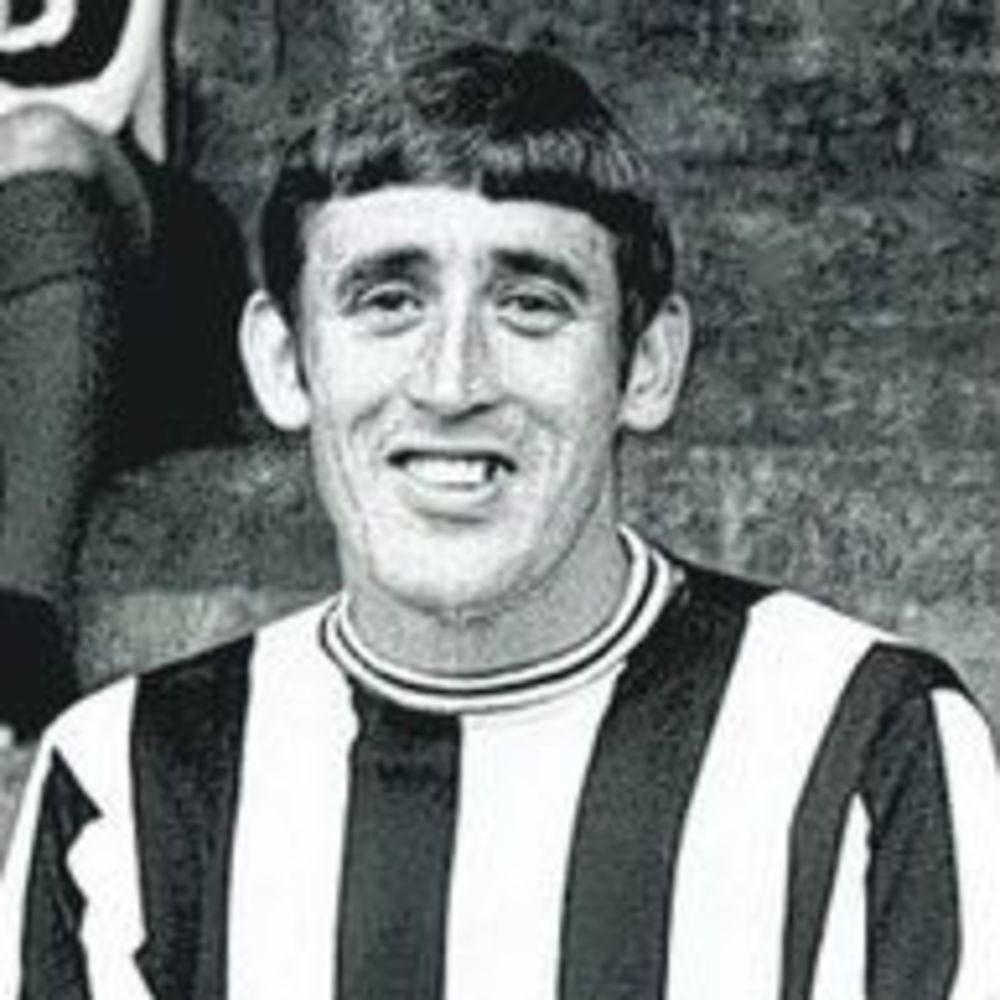
Graham Rathbone
Graham Rathbone was the archetypal centre-half of the 1960s and 70s.
Obviously known as `Basil` - a nickname deriving from 1930s British and Hollywood film actor Basil Rathbone most famous as the definitive screen Sherlock Holmes, he was known for his rugged tackling and a `thou shalt not pass` attitude which later got him into trouble with the powers that be.
He started his career in the Southern League with Merthyr Tydfil as a teenager before being signed by Third Division Newport County in 1960.
And he went on to establish himself with the club, making almost 200 appearances and scoring 7 goals.
He was then transferred from a now Fourth Division Newport to Third Division Grimsby Town for £10,000 in England's World Cup-winning year.
And Rathbone became an aggressive leader opposing strikers would remember.
A resolute member of Laurie McMenemy's 1971/72 Fourth Division champions, Rathbone was indeed unfortunate to be suspended for eight weeks together with Don Welbourne of Scunthorpe United for fighting.
The timing of the altercation was at the start of 1969/70 season when the FA had just announced a get-tough clampdown regarding on-field behaviour, seen by them as a major factor in the burgeoning football spectator hooliganism.
A dislocated shoulder meant he failed to see out the 1971/72 title-winning campaign and he subsequently lost his place to Clive Wigginton.
The following season he was loaned out to Cambridge United and helped the U's also win Division Four before his permanent switch to the Abbey Stadium in June 1973.
He played 36 times for United and as Ron Atkinson arrived to take over as manager at the Abbey Stadium, Rathbone signed for his former club, Southern League Premier Division Kettering Town where he spent a couple of seasons.
He passed away in January 2012, aged 69, in his hometown of Newport after a long battle with dementia.
Goalkeeper Steve Crompton started his career as a 16-year-old with Manchester City, winning an FA Youth Cup medal with the Maine Road outfit in 1986.
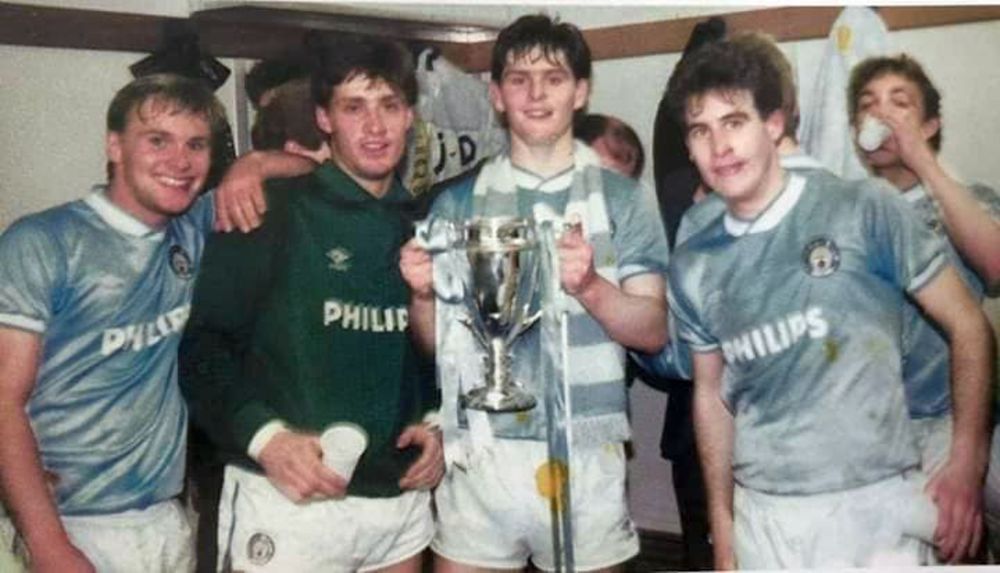
Steve Crompton after FA Youth Cup
That was an outstanding team that included the likes of Ian Brightwell, David White, Steve Redmond, Andy Hinchcliffe and Paul Lake. However, with big Joe Corrigan still dominating the green jersey in the first-team, Crompton was forced to move on to play more regularly and he went on to join Carlisle United.
He played 20 times for the Cumbrians and a further couple with Stockport County before playing in the Northern Premier League for Mossley ahead of joining Wycombe Wanderers in the Conference in 1988.
He started out as first choice under Martin O`Neill until the arrival of Trinidad & Tobago international John Granville.
He left for Hounslow, but couldn`t prevent them from being relegated to the Hellenic League at the end of the 1989/90 season.
He moved on to Isthmian League Premier Division side Harrow Borough in the summer of 1990 and went on to earn representative honours for the FA XI against the Combined Services.
After making 140 appearances for Boro, Crompton headed west to sign for Southern Premier Division Gloucester City.
He totalled 63 games for the Tigers and wound down his playing days with then-Hellenic Leaguers Cirencester Town and then Isthmian Premier outfit Chesham United.
Crompton is now managing director of a recruitment consultancy in Birmingham.
John Crabbe was a midfielder or defender who went on to make 365 League appearances.
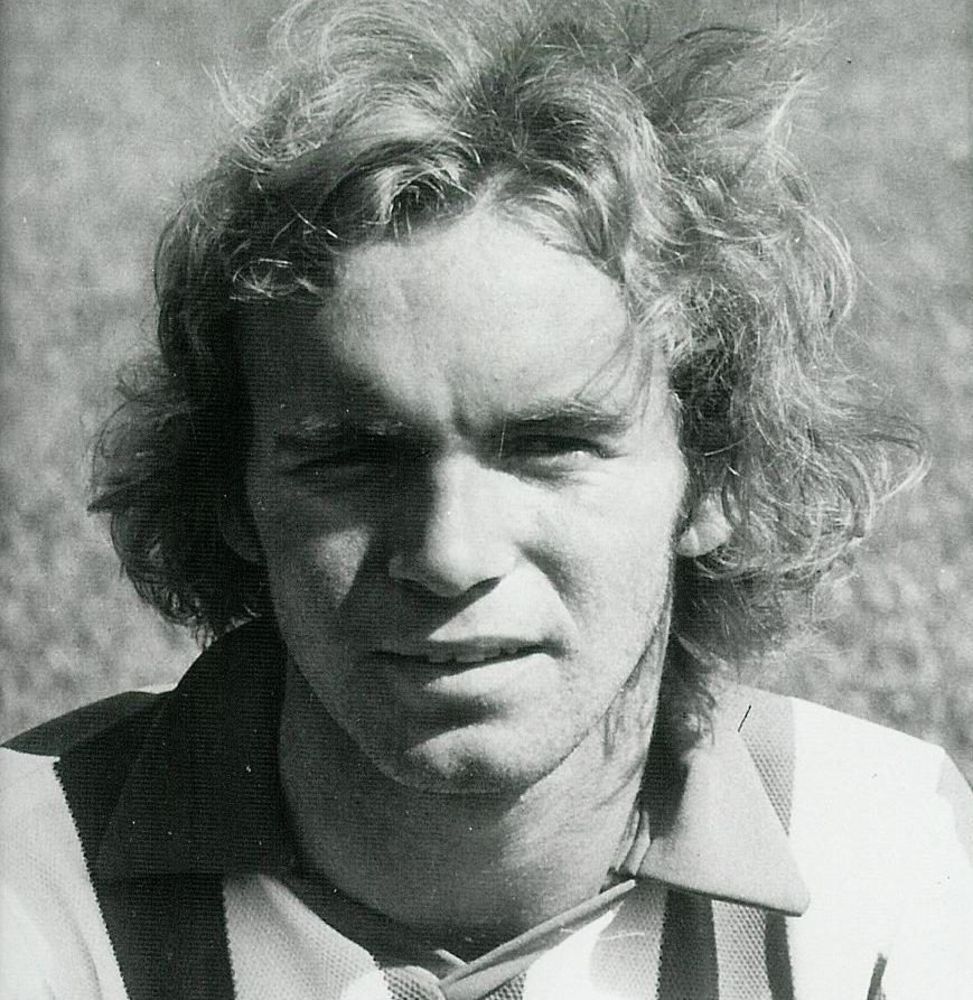
John `Buster` Crabbe
Nicknamed `Buster` after the actor, he was born in Weymouth and graduated through Southampton’s successful youth ranks.
He was introduced into the first team for a Third Round FA Cup tie in January 1975 and had a handful of games in midfield before Jim McCalliog arrived at The Den.
There was room for the two of them for a few games towards the end of that season, but two substitute appearances in 1975/76 brought Crabbe`s first-team career to a close.
He was on loan with Hellenic in Cape Town, South Africa while the Saints were busy winning the FA Cup.
Loaned again in January 1977, now to Third Division Gillingham, he scored on his debut and Gills wasted no time in securing his permanent transfer for £10,000.
He went on to make 181 appearances for the Gills and would have played even more games had he not broken an arm.
Joining Bob Stokoe’s Carlisle United at the start of the 1981/82 season, he and helped them achieve promotion to Division Two, but when dropped towards the end of the campaign, he joined Hereford United, but couldn’t stop them finishing 92nd and bottom of the Football League.
Now approaching 30, he had two solid seasons with Dario Gradi’s Crewe Alexandra before winding down, after a Finnish summer with Keps, at Torquay United.
Despite frequent Achilles problems from his late 20s onwards, Crabbe turned to non-League football, firstly with Southern League Premier Division Crawley Town from 1986 to 1987 and then Southern League Southern Division side Canterbury City, who he joined in 1987 and was made player-coach in the summer of 1989.
Whilst at Kingsmead, Crabbe returned to Finland for the summer of 1988 with Kuopion Palloseura and then left City in 1990 to sign for league rivals Ashford Town.
After two seasons at the Homelands, he finished off his playing career with a five-year spell as player-coach at then-Kent Leaguers Whitstable Town.
In 1997, he returned to his home-town Weymouth to coach under former Nottingham Forest and England midfielder Neil Webb, taking over as manager after the latter’s departure.
Following a spell as assistant manager of Lordswood, he assisted in the Saints-in-the-Community scheme and turned out for the Ex-Saints until he broke his neck in a kick-about with his son.
Sidelined for some eight months, he returned to work as a carpenter in Weymouth.
Brian Gambrill was a goalkeeper who had an `interesting` career!
Born Whitstable, Kent, he signed for his home-town club in the Kent League and was also a paratrooper whilstg on National Service.
He was signed by Third Division Millwall in December 1965 and later that season, Gambrill deputised for Alex Stepney in a League Cup Fourth Round tie against Peterborough United at The Den.
Gambrill let in a couple of `howlers` as Millwall lost 4-1 and he didn`t play in the senior side again.
He moved to Southern League Division One side Canterbury City in the summer of 1966.
In 1970, he moved to league rivals Ashford Town for £300 and conceded SEVEN goals on his home debut in a 7–1 defeat to Worcester City!
His understudy at Ashford was a teenager called Tony Godden, who was sold to West Bromwich Albion and, of course, went on to play over 300 times for the Baggies.
Dai Lawrence was a Welsh Amateur international full back who featured in Swansea Town's 1969/70 promotion campaign.
Locally born, the son of former Swans` captain Syd Lawrence, he played Southern League football with Merthyr Tydfil before signing for the Swans in 1967, turning professional at the Vetch Field in May 1967.
He made his Football League debut in Swansea's 5-2 win at home to Workington five months later.
He appeared in the 1969 Welsh Cup final and scored twice in 97 games.
In 1971, he moved to Southern Premier Division side Chelmsford City along with Swansea team-mate Vic Gomersall in August 1971, helping win the Southern League title in 1971/72.
Lawrence returned to play for Merthyr as well as Bridgend Town, Lewistown, Maesteg Park and Llanelli before hanging up his boots.
He passed away, aged just 62, in July 2009.
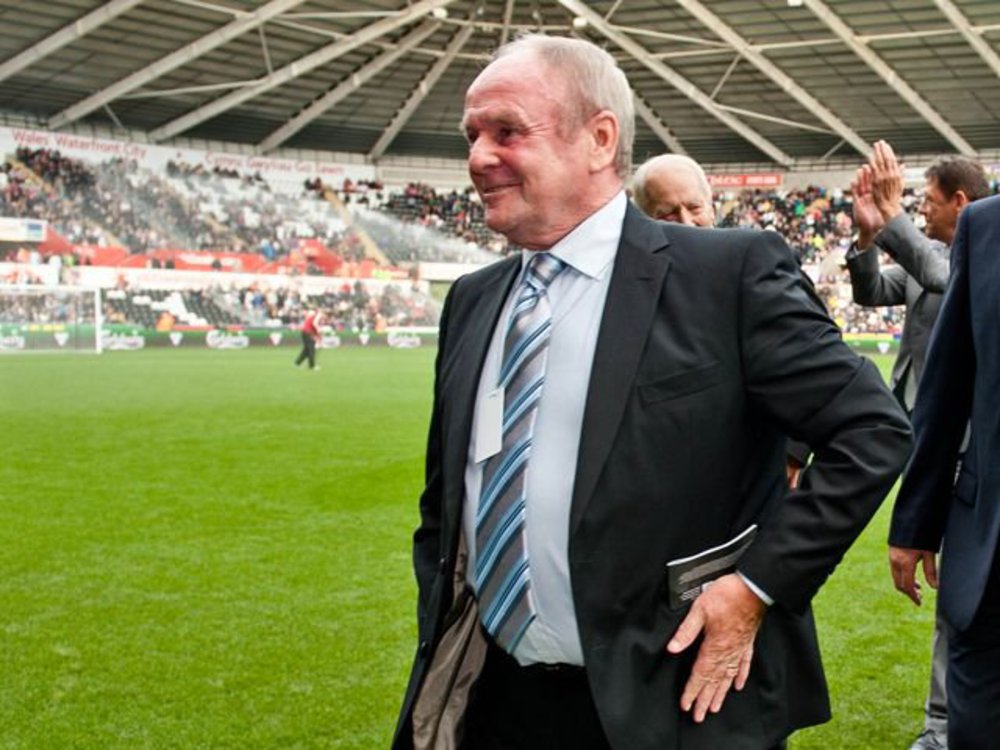
Vic Gomersall
His former team-mate with several teams, left-back Vic Gomersall, was an influential figure in Swansea's 1969/70 promotion success.
Signing professional for Manchester City in July 1960, he contested a first-team slot with Cliff Sear and moved to the Vetch Field for £5,000 in August 1966.
He played against Arsenal and Leeds United in FA Cup matches and was a Welsh Cup finalist in 1969.
Scoring 6 times in 178 games for Swansea, he followed Lawrence to Chelmsford City in August 1971 and helped them win the Southern League title in 1971/72.
He played alongside Lawrence again at Llanelli and also had spells with Haverfordwest County and Pontardawe in the Welsh League and then helped with hospitality at Swansea`s home matches.
Freddie Hyatt was a midfielder with a powerful shot and long-throw who started out at Southern League Hounslow.
He later played for Ruislip and Burnham in the Southern League before joining Isthmian Leaguers Wokingham.
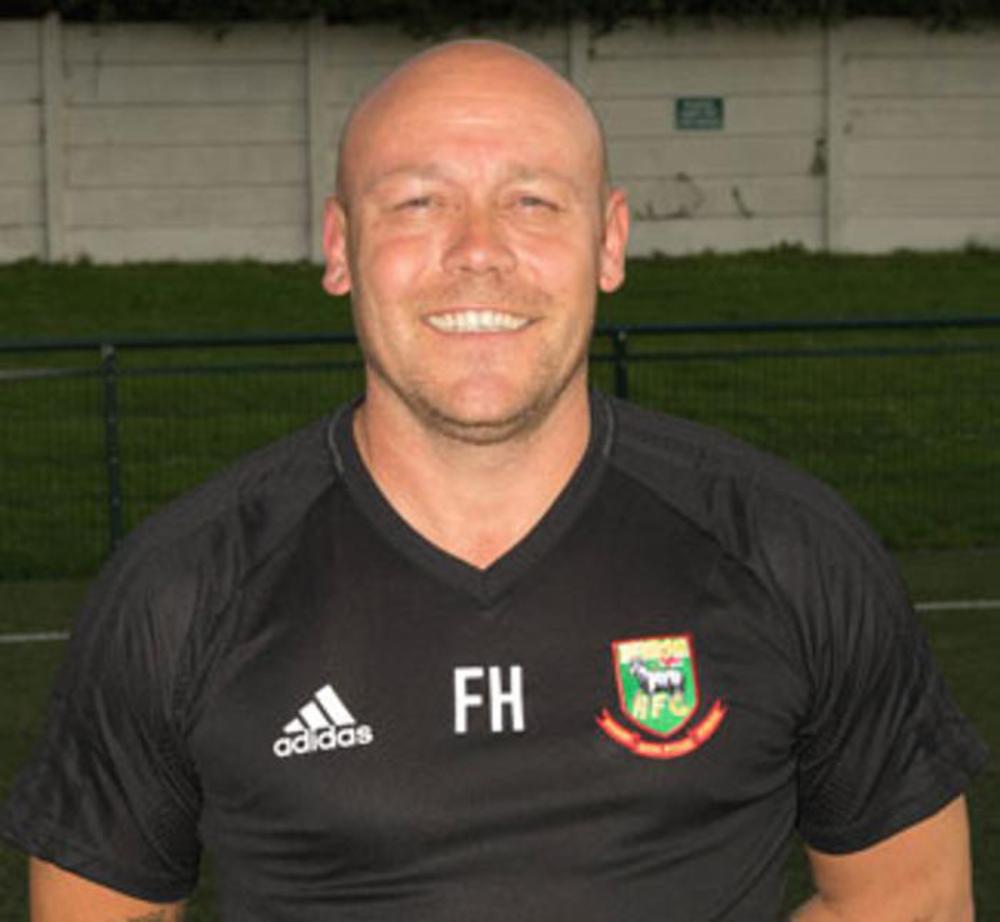
Freddie Hyatt
He remained in the Isthmian in 1995, joining Hayes for a small fee and was a member of their Isthmian League winning side in 1996 and continued into the Conference era.
He made 81 appearances and scored 6 goals for the Missioners before moving to Hendon.
He subsequently played for Chelmsford City back in the Southern League and then St Albans City and Bishop's Stortford.
Big striker Phil Gee was a teenage sensation in the West Midlands (Regional) League in the early 1980s.
After starting out local side Riley Sports, he joined Bloxwich Town and began scoring goals regularly in the WMRL and then signed for rivals Gresley Rovers in the summer of 1985.
However, his stay at The Moat Ground was a brief one as, after scoring 6 goals in the opening 5 games of the 1985/86 season, he was snapped up by a then-struggling Third Division Derby County for £5,000 in September 1985 after being recommended by then-Gresley chairman David Nish, the ex-Leicester City, Derby and England left back.
He helped the Rams to win promotion in his first season and then to the old Second Division championship in 1987.
He went on to make 124 appearances for Derby, scoring 26 goals before moving to Leicester City, along with team-mate Ian Ormandroyd as the £200,000 make-weight in a deal which took forward Paul Kitson in the opposite direction.
He spent four years at Filbert Street but was in and out of the team and had a spell on loan with Plymouth Argyle in 1995/96 before being released at the end of the season.
He had a couple of seasons with Hednesford Town when the Pitmen were in the Conference ad then ended his playing days in the Southern Midland Division with Shepshed Dynamo.
Geordie striker Steve Cuggy started his career with Sunderland and was also allowed to turn out for then-Northern League side Blyth Spartans.
He was released by the Black Cats in the summer of 1990 and joined Blyth on a more permanent basis and scored 45 goals in 1990/91.
That created a good deal of interest in the striker and a then-Fourth Division Maidstone United for a £2,000 fee and he went on to play 16 times for the Stones – all-bar three of them coming off the bench, before the club sadly folded.
In the summer of 1992, Cuggy signed for Dover and, despite finishing as top scorer with 25 goals as the club won the Southern League Premier Division title, he was allowed to move to Southern South Division neighbours Margate in September 1993 for a fee of around £5,000 – a record for Gate at the time.
He enjoyed a prolific couple of seasons at Hartsdown Park, netting 64 goals in 100 games, before being transferred to Southern Premier Division Hastings United for £13,000.
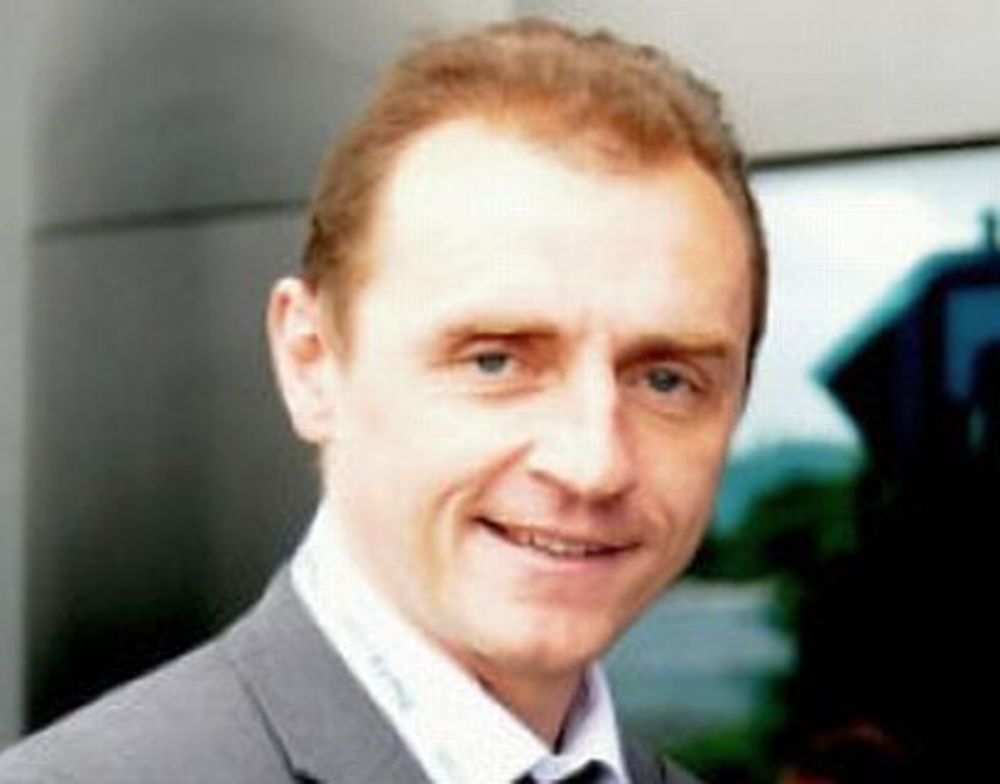
Steve Cuggy
He again finished as top scorer in his first season at the Pilot Field with 24 goals and did likewise the following campaign which included a spell on loan back in his native north-east with Conference side Gateshead.
In September 1997, he made a somewhat surprising move to a then-Kent League Folkestone Invicta and netted 30 times in 1997/98 and helped the club into the Southern League.
However, the pull of home was proving too much and he left Kent to join Northern League Bedlington Terriers and then Whitley Bay and was a member of the side that won the FA Vase against Tiptree United at Villa Park in May 2002.
He had a spell with Chester-le-Street before hanging up his boots at the end of the 2002/03 season.
Cuggy then enjoyed a successful spell as assistant manager to Ian Chandler back at Whitley Bay, and helped to win the Vase three years running and also made a brief comeback as a player.
In May 2011, Cuggy was appointed as manager of Conference North side Blyth Spartans. However, he parted company with the Croft Park outfit after just seven months in charge.
In May 2012, he was appointed as assistant boss at Northern Leaguers Newcastle Benfield.

Most clubs are looking for volunteers. Find out more on the button below:
www.PitchingInVolunteers.co.ukAll the news and results in one place.
REGISTER